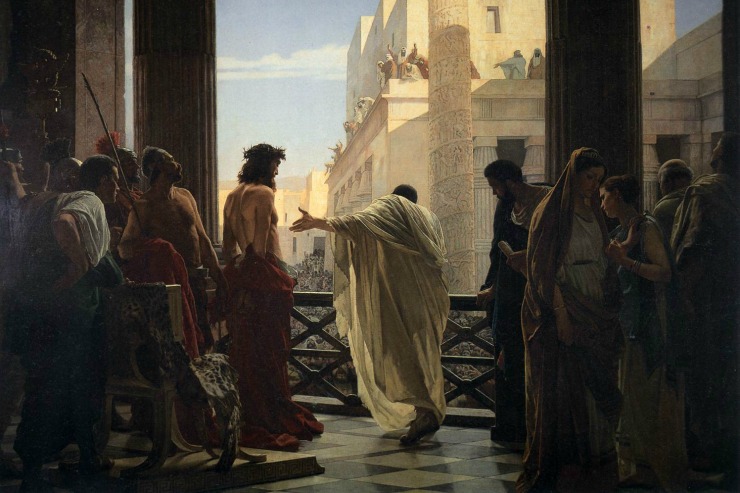
Friedrich Wilhelm Nietzsche
Nietzsche – self-proclaimed “Anti-Christ”
Friedrich Nietzsche called himself “the Anti-Christ,” and wrote a book by that title. He argued for atheism as follows: “I will now disprove the existence of all gods. If there were gods, how could I bear not to be a god? Consequently, there are no gods.”
He scorned reason as well as faith, often deliberately contradicted himself, said that “a sneer is infinitely more noble that a syllogism” and appealed to passion, rhetoric and even deliberate hatred rather than reason.
He saw love as “the greatest danger” and morality as mankind’s worst weakness. He died insane, in an asylum, of syphilis-signing his last letters “the Crucified One.” He was adored by the Nazis as their semi-official philosopher.
Yet he is admired as profound and wise by many of the greatest minds of our century. How can this be?
There are three schools of thought about Nietzsche. Most popular among academics is the school of the “gentle Nietzscheans,” who claim that Nietzsche was, in effect, a sheep in wolf’s clothing; that his attacks should not be taken literally and that he was really an ally, not an enemy, of the Western institutions and values which he denounced.
These scholars resemble theologians who interpret sayings of Jesus like: “no one can come to the Father but through me” as meaning “all religions are equally valid,” and “he who marries a divorced woman commits adultery” as meaning “let your divorces be creative and reasonable.”
Second, there are the “awful, awful” Nietzscheans. They at least pay Nietzsche the compliment of taking him seriously. They are typified by the footnote in an old Catholic textbook on modern philosophy, which said only that Nietzsche existed, was an atheist and died insane-a fate which may well await anyone who looks too long into his books.
A third school of thought sees Nietzsche as a wolf indeed and not a sheep, but as a very important thinker because he shows to modern Western civilization its own dark heart and future. It’s easy to scapegoat and point fingers at “blacksheep” like Nietzsche and Hitler, but is there not a “Hitler in ourselves” (to quote Max Picard’s title)? Did not Nietzsche let the cat out of the bag? The demonic cat that was hidden in the respectable bag of secular humanism? Once “God is dead,” so is man, morality, love, freedom, hope, democracy, the soul and ultimately, sanity. No one shows this more vividly than Nietzsche. He may have been responsible (quite unintentionally) for many conversions.
Nietzsche’s main themes can be summarized by the titles of his main books. Each is, in a different way, an attack on faith. The center of Nietzsche’s philosophy is always the same: He is as centered on Christ as Augustine was, only he centered on Christ as his enemy.
Nietzsche’s first book, “The Birth of Tragedy from the Spirit of Music,” single-handedly revolutionized the accepted view of the ancient Greeks as all “sweetness and light,” reason and order. For Nietzsche, the tragic poets were the great Greeks, and the philosophers, starting with Socrates, were the small ones, pale and passionless. All the Western world had followed Socrates and his rationalism and moralism, and had denied the other, darker side of man, the tragic side.
Nietzsche instead exalted tragedy, chaos, disorder and irrationality, symbolized by the god Dionysus, god of growth and drunken orgies. He claimed that Socrates had turned the world instead to the worship of Apollo, god of the sun, light, order and reason. But the fate of Nietzsche’s god Dionysus was soon to overtake Nietzsche himself; as Dionysus was literally torn apart by the Titans, supernatural monsters of the underworld, Nietzsche’s mind was to be cracked asunder by his own inner Titans.
“The Use and Abuse of History” continued the Dionysian-vs.-Apollonian theme. The “abuse of history” is (according to Nietzsche) theory, science, objective truth. The right use of history is to enhance “life.” Life and truth, fire and light, Dionysus and Apollo, will and intellect, are set in opposition. We see Nietzsche being torn apart here, for these are the two parts of the self.
“Ecce Homo” was pseudo-autobiographical shameless egotism. Though he was only a stretcher-bearer in the war, Nietzsche calls himself a “swaggering old artillery man” adored by all the ladies. In fact, he was a lonely old man who could not stand the sight of blood, an emotional dwarf prancing like Napoleon. What’s most terrifying is that he willingly embraces his falsehood and fantasy. It is consistent with his philosophy or preferring “whatever is life-enhancing” to truth. “Why not live a lie? He asks.
“The Genealogy of Morals” claimed that morality was an invention of the weak (especially the Jews, and then the Christians) to weaken the strong. The sheep convinced the wolf to act like a sheep. This is unnatural, argues Nietzsche, and seeing morality’s unnatural origin in resentment at inferiority will free us from its power over us.
“Beyond Good and Evil” is Nietzsche’s alternative morality, or “new morality.” “Master morality” is totally different from “slave morality,” he says. Whatever a master commands becomes good from the mere fact that the master commands it. The weak sheep have a morality of obedience and conformity. Masters have a natural right to do whatever they please, for since there is no God, everything is permissible.
“The Twilight of the Idols” explores the consequences of “the death of God.” (Of course God never really lives, but faith in Him did. Now that is dead, says Nietzsche.) With God dies all objective truths (for there is no mind over ours) and objective values, laws and morality (for there is no will over ours). Soul, free will, immortality, reason, order, love-all these are “idols,” little gods that are dying now that the Big God has died.
What will replace God? The same being who will replace man; the Superman. Nietzsche’s masterpiece, “Thus Spake Zarathustra,” celebrates this new god.
Nietzsche called “Zarathustra” the new Bible, and told the world to “throw away all other books; you have my “Zarathustra.” It is intoxicating rhetoric, and it has captivated adolescents for generations. It was written in only a few days, in a frenzy, perhaps of literally demon-inspired “automatic writing.” No book ever written contains more Jungian archetypes, like a fireworks display of images from the unconscious.
Its essential message is the condemnation of present-day man as a weakling and the announcement of the next species, the Superman, who lives by “master morality” instead of “slave morality.” God is dead, long live the new god!
But in “The Eternal Return” Nietzsche discovers that all gods die, even the Superman. He believed that all history necessarily moved in a cycle, endlessly repeating all past events-“There is nothing new under the Sun.” Nietzsche deduced this disappearing conclusion from the two premises of (1) a finite amount of matter and (2) an infinite amount of time (since there is no creator and no creation); thus every possible combination of elementary particles, every possible world, occur an infinite number of times, given infinite time. All, even the Superman, will return again to dust, and evolve worms, apes, man and Superman again and again.
Instead of despairing, as Ecclesiastes did, at this hopeless new history, Nietzsche seized the opportunity to celebrate history’s irrationality and the triumph of “life” over logic. The supreme virtue was the will’s courage to affirm this meaningless life, beyond reason, for no reason.
But in Nietzsche’s last work, “The Will to Power,” the lack of an end or goal appears as demonic, and mirrors the demonic character of the modern mind. Without a God, a heaven, truth, or an absolute Goodness to aim at, the meaning of life becomes simply “the will to power.” Power becomes its own end, not a means. Life is like a bubble, empty within and without; but its meaning is self-affirmation, egotism, blowing up your bubble, expanding the meaningless self into the meaningless void. “Just will,” is Nietzsche’s advice. It does not matter what you will or why.
We are now in a position to see why Nietzsche is such a crucially important thinker, not despite but because of his insanity. No one in history, except possibly the Marquis de Sade, has ever so clearly, candidly and consistently formulated the complete alternative to Christianity.
Pre-Christian (i.e., pagan) societies and philosophies were like virgins. Post-Christian (i.e., modern) societies and philosophies are like divorcees. Nietzsche is no pagan pre-Christian, but the essential, modern post-Christian and anti-Christian. He rightly saw Christ as his chief enemy and rival. The spirit of Anti-Christ has never received such complete formulation. Nietzsche was not only the favorite philosopher of Nazi Germany, he is the favorite philosopher of hell.
We can thank Satan’s own foolishness in “blowing his cover” in this man. Like Nazism, Nietzsche may scare the hell out of us and help save our civilization or even our souls by turning us away in terror before it’s too late.
This is Part 3 of a 6-part series, The Pillars of Unbelief, by Dr. Kreeft.
Please help us in our mission to assist readers to integrate their Catholic faith, family and work. Tell your family and friends about this article using both the Recommend and Share buttons below and via email. We value your comments and encourage you to leave your thoughts below. Thank you! – The Editors















